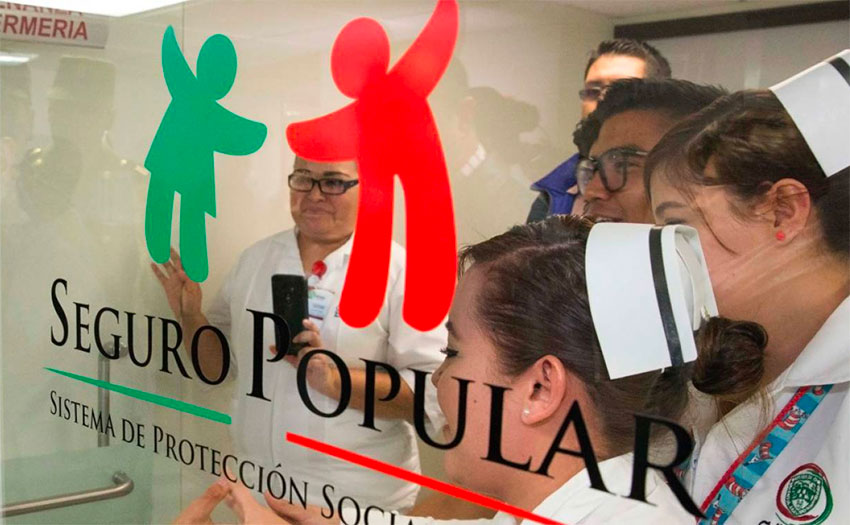The president said new health service will work with universities to train more
by Mexico News Daily
<p>President López Obrador says Mexico needs 123,000 more doctors to cover the country’s needs.
“There are 270,600 general practitioners in the country, and according to international norms, we should have 393,600 doctors,” he said during a visit to a rural hospital in Michoacán on Saturday. “That means we’re 123,000 doctors short.”
According to the Organization for Economic Co-operation and Development (OECD), a country should have one doctor for every 333 residents. Based on a 2017 World Bank estimate, Mexico has only one doctor for every 477 people.
The president added that the shortage of doctors is related to low admission rates at universities for medicine programs.
“That’s why there’s a shortage,” he said. “We need more general practitioners, we need more specialists.”
He said 13,000 people applied for admission to the faculty of medicine at the National Autonomous University, but only 216 were accepted. The most popular career choice among prospective students is that of a surgeon. In February, López Obrador said, there were 11,198 applicants for 140 places.
He said the new National Institute of Health for Well-Being will work with universities to train more doctors.
The institute, which has not yet been approved by Congress, will operate with a budget of 80 billion pesos (US $4.2 billion) and replace the Seguro Popular, offering medical services to people who are not covered by social security.
Source: Notimex (sp), W Radio (sp)
Nervous foreign investors are pulling back, see higher risk in Mexico
They have been selling off government securities since February
Foreign holders of government securities have begun withdrawing their investments due to declining confidence in the federal government and the Mexican economy, and the expectation that the Bank of México will cut interest rates.
Statistics from the central bank show that the value of government bonds and federal treasury certificates in the hands of foreign investors was 2.11 trillion pesos (US $111 billion) on July 9, the lowest amount since December 14.
Since February 8 – when the value of government debt in foreign hands hit a record high – investors have offloaded securities worth 162 billion pesos (US $8.5 billion), the newspaper El Universal reported.
Foreign investment in treasury certificates, which are easier to cash in, has declined to its lowest level since March 2018.
“Investors are already starting to get nervous and while they perceive greater risk, we may see more sales of government securities and the interest rate for bonds may go up,” said Ernesto O’Farrill, general manager of Bursamétrica, a Mexico City brokerage firm.
Despite decisions such as the cancelation of the new Mexico City airport, the federal government generated confidence among investors during its first months in office after presenting a 2019 budget that was described as fiscally prudent and realistic by many analysts.
The first sell-off of government issued securities by the López Obrador administration in the middle of January garnered strong interest from investors.
More than 300 institutional investors from the Americas, Europe, Asia and the Middle East participated in the auction and demand to purchase securities exceeded supply fourfold.
But investor confidence has waned on the back of downgrades to Mexico’s sovereign rating and that of Pemex, and the possibility that more ratings cuts are still to come.
“Investors are anticipating rating agencies’ adjustments and they deduce that Moody’s will strip Pemex’s investment grade in coming months like Fitch did at the start of last month,” O’Farrill said.
He predicted that agencies will also downgrade Mexico’s sovereign rating but not below investment grade. Fitch cut its sovereign rating for Mexico to one notch above junk status last month but if it, and other rating agencies went lower, a huge sell-off of government bonds would occur.
“Ninety-five per cent of investors are in government securities because Mexico has investment grade,” O’Farrill said.
Other factors that have made investors nervous are the widespread cuts to growth forecasts for the Mexican economy and Carlos Urzúa’s resignation last week as finance secretary.
El Universal reported that investors now see instability in the implementation of public policy and have responded by withdrawing their investments in government securities. The pullback could hasten as the Bank of México draws closer to cutting interest rates, which many analysts believe will happen in August or September.
Yet another factor weighing on some investors’ minds is the decision by the Federal Electricity Commission (CFE) to seek international arbitration aimed at annulling clauses in seven pipeline contracts.
One of the contracts the utility is seeking to renegotiate is for the Texas-Tuxpan gas pipeline, which was jointly built by the Canadian company TC Energy (formerly TransCanada).
Canadian ambassador Pierre Alarie spoke out against the CFE’s move, while the embassy’s deputy head of mission said that the legal action has triggered concern among Canadian investors.
“The truth is that since the actions of the CFE, I receive calls every day with regard to the signal that Mexico is sending to Canadian investors. They ask for our advice in order to know if Mexico still wants more investment and what to do with their current and upcoming investment. Yes, they’re actions that cause concern,” Jean-Dominique Leraci said.
Source: El Universal (sp), Milenio (sp).</p>



